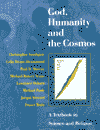Quantum-Based Proposals on Divine ActionThe best way to compare theories of divine action in detail is to ask - what, for each theory, is ‘the causal joint’ at which God - as a transcendent, immaterial world cause - interacts particularly with causative factors in the material world? One important approach to asserting particular providence through gaps in the causal order is to follow a suggestion first made by Pollard in 1958 and locate theologically-productive indeterminacy at the quantum level, rather than at the macroscopic level. This has the advantage that there is more general (though not universal) agreement that these systems are genuinely non-deterministic (see Shaking the Foundations: the implications of quantum theory). So Thomas Tracy gives the following five types of divine agency, in addition to the initial creation:
(The Tracy quotations and the basis of the titles are taken from Clayton 1997:215) It is an interesting exercise to compare
this list with the one given in An Introduction to
Divine Action: Isaac Newton’s God. Note Philip Clayton’s comment: ‘all but
the last of these five can be accepted without affront to natural law.’ This seems at first sight a very promising way to combine the Christian belief in divine action with modern scientific perceptions of the world. But see criticisms of quantum-based proposals on divine action.
Email
link | Feedback | Contributed by: Dr.
Christopher Southgate |




